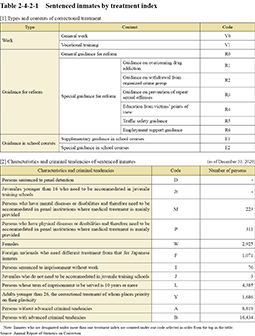1 Treatment indexes and treatment guidelines
The core of correctional treatment for sentenced inmates consists of work, guidance for reform and guidance in school courses. The contents and delivery of correctional treatment must be tailored to individual characteristics and circumstances of each sentenced inmate (principle of individualized treatment).
Each penal institution conducts an assessment of individual characteristics and circumstances of each sentenced inmate (treatment assessment), utilizing specialized knowledge and techniques, such as medicine, psychology, pedagogy and sociology. A detailed assessment is conducted at designated penal institutions (assessment centers) for newly sentenced inmates aged less than 26 and sentenced inmates who need a specific assessment to be enrolled in special guidance for reform.
Following the assessment (including an assessment at assessment centers) upon commencement of execution of a sentence, penal institutions designate one or more treatment indexes for each sentenced inmate. The treatment indexes take into account the types and contents of correctional treatment, and characteristics and criminal tendencies of sentenced inmates. Table 2-4-2-1 shows the number of sentenced inmates as of the end of 2020 by their treatment index.
Table 2-4-2-1 Sentenced inmates by treatment index
Click here for the Excel file (Japanese)
A treatment guideline, which indicates the goals, basic contents and methods of correctional treatment, is specified for each sentenced inmate in accordance with the result of a treatment assessment that takes place upon the commencement of execution of his/her sentence. Correctional treatment is implemented based on the treatment guidelines.
